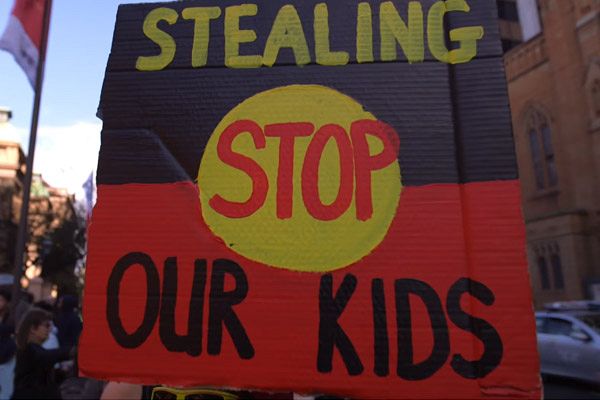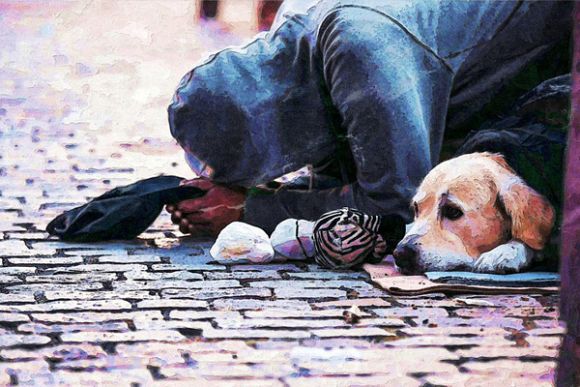Instead of offering assistance, our political system is one that would sooner incarcerate children in desperate need, writes Gerry Georgatos.
THE STORY you are about to read is not an outlier, not just some incidental tale, but thematic of a significant sliver of children and youth failed by state institutions, by governments, by muddled-minded politicians, policymakers and bureaucrats. It is a story of eight orphaned siblings. Many will find their story unimaginable in today’s Australia, as if a Dickensian tale.
In January, a 13-year-old and his 18-year-old brother with his 17-year-old female partner walked into our Perth offices. They were tired of sleeping on the streets, in alleyways, squats and traps, their heads resting on pavements and grass instead of pillows. It will horrify most Australians to know that nearly twenty per cent of Australia’s homeless are children less than 12 years of age. There are toddlers homeless and I have come across babies on the streets; etched in my mind is a baby who spent the first six months of her life street homeless.
Sorrowed were our hearts that we could not immediately permanently accommodate these three young ones. We defaulted them into the care of a kind mother well known to us, herself impoverished, who never turns away anyone and whose home is similar to a halfway house.
I involved a sister project, the courageous First Nations Homelessness Project, to also support these three children and between us ramp up everything possible to secure the young ones a permanent home. Thanks to the FNHP’s Sharon Whitby and Jennifer Kaeshagen, a permanent home was made possible some six weeks ago.
As a result, the 13-year-old is in school more often than not. His 18-year-old brother is now his guardian and all three have a home of their own and no longer walk the streets. There are now salt-of-the-earth services, including us, supporting them in assisted independent living.
I believe it is important for as many Australians as possible to know some of their story. It is a story across three states, one end of the continent to the other. We are also supporting one of their siblings interstate.
Four years ago, their mother took her life in the most horrendous circumstance. The year prior, their father had taken his life. Eight children became orphans — the oldest was 18, the youngest was five years in age. They would be scattered across the country and most of them failed by one institution after another.
The two boys who walked into my Rivervale (Perth) office had both spent time on a number of occasions in Banksia Juvenile Detention Centre, a children’s prison. Last year, the now 13-year-old went in and out of Banksia 13 times. On most occasions, he left Banksia into homelessness. Where was the Department of Child Protection when most needed? How could they have failed this kid?
The older brother, now the younger one’s guardian, spent much of his mid-teenage years following his parents’ deaths on his own. He, too, spent time back and forth from homelessness and juvenile detention. Between 14 and 16 years of age, in and out of Banksia. How did the Departments of Corrective Services, Child Protection and more importantly our governments fail these children?
The 18-year-old said:
I used to walk and walk and walk when I was homeless. When I got tired, I found somewhere to sleep. Sometimes I would steal to feed myself. Sometimes I stole from other homeless people, went into their bags when they were asleep. That’s what we had to do, all of us.
My feet had become sore from wearing the same socks for weeks. I smashed a shop window and then waited for the police. I wanted to be locked up so I could get a change of clothes and a rest. When the police approached, I panicked as they screamed at me — I ran. They chased and finally slammed me to the ground.
In Banksia, I had a roof over my head, a bed, a shower, fresh clothes, three meals a day.
What used to make me sad at Banksia, the caseworkers and also with the police was that they didn’t ask me much about my life; no one asked me why I did the stealing or why I was homeless.
I visit these youths every so often and there are now some good people supporting them. There still remains a lot of unaddressed trauma and harrowing imaginings swirling in their minds. They miss their parents. They miss each other, of times when once they were all together. A few days ago, I visited the boys and one of their brothers had come to visit from another part of the state. Though they have a long journey ahead of them – and I cannot emphasise this enough – it was beautiful to see them in the perfunctory circumstance of a home of their own.
There is so much more to this story, of their lives and journeys, that would singe the soul, ache the heart, wrench the gut and flood tears, but strength is what we must impart and flicker perceivable light on the horizon. I cannot close this brief read for you, my sisters and brothers, without a parting shot at our governments and institutions. What sort of society are we that gaols children as young as ten years old, gaols orphans, gaols children who are homeless, gaols children for stealing food to survive?
This story should be a Dickensian tale of long ago pasts, but it is a present-day tale of reprehension and abomination and should burn deep inside us and rage us relentlessly ‘til stories such as this are no more. Why are these stories not on the front pages of our nation’s newspapers or broadcast into our households' first port-of-call in the evening news?
All we did was spread love.
Gerry Georgatos is the national coordinator of the National Suicide Prevention & Trauma Recovery Project. Gerry can be contacted at coordinator@suicidepreventionnationnal.com.au or you can follow Gerry on Twitter @GerryGeorgatos.
Related Articles
- Suicide toll may decrease for Australia overall but not for First Peoples
- The shocking truth of Australia's Indigenous incarcerated
 This work is licensed under a Creative Commons Attribution-NonCommercial-NoDerivs 3.0 Australia License
This work is licensed under a Creative Commons Attribution-NonCommercial-NoDerivs 3.0 Australia License
Support independent journalism Subscribe to IA.














